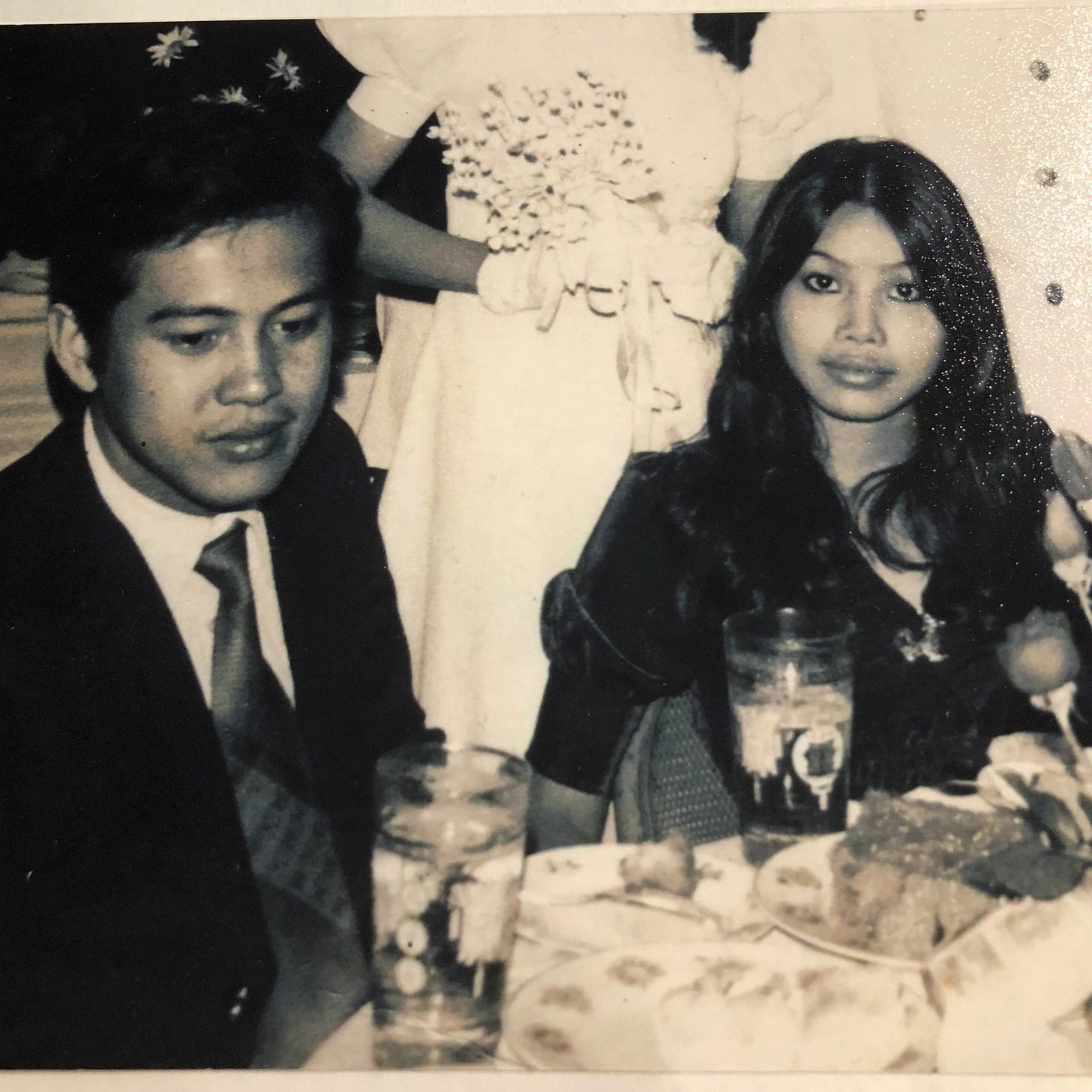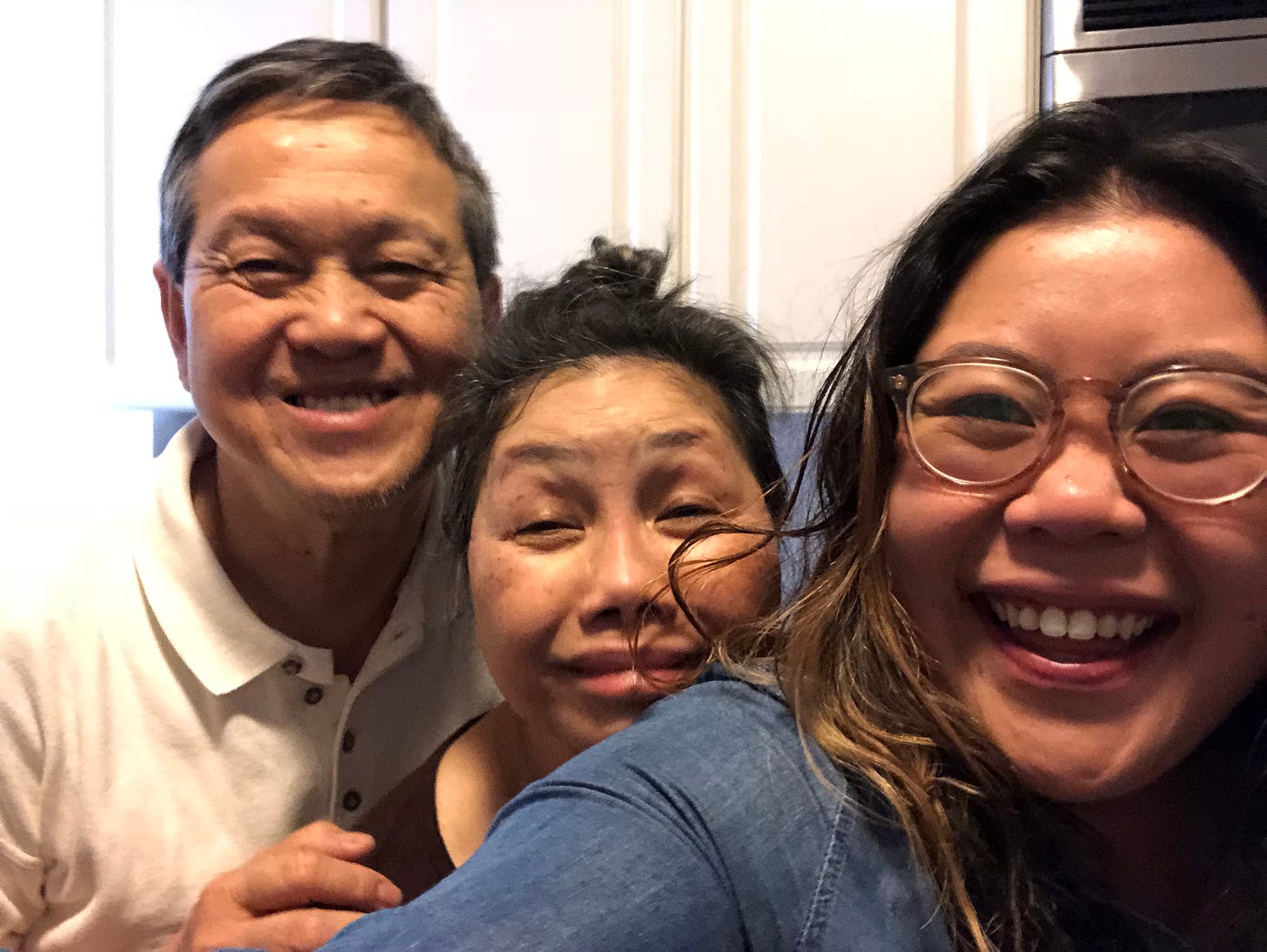On telling my parents' story
And fighting my first-gen imposter syndrome that prevented me from doing so for almost 20 years
Contemplations
How does imposter syndrome stand in the way of your creative process? Of your life?
How can you release and rewrite this narrative that you are incapable?
In which ways can you honor the untold stories in your family?
***
The last 72 hours have been an emotional roller coaster, filled with an immense amount of tears — joyful and cathartic.
It has been almost 20 years at this point that I have sat with the burning and unspeakable need to tell my parents' story of how my mother searched for my father for two and half years in a Communist Vietnam so they could escape and start a new life in America. That need is not just to preserve our family history, but a larger desire to share an often forgotten and buried story that is shared by millions of Vietnamese refugees.
I have had the privilege to tell many stories in my lifetime but it is with the utmost pride that I share their story through the Vietnamese Boat People podcast. (Please consider donating to Vietnamese Boat People, so they can continue their mission of mapping and documenting the millions of stories of Vietnamese refugees, like my parents.) My sister and I sat down to hear their love story, as they approach their 50th wedding anniversary.
The 35-minute episode can be found here or on Apple podcasts here. I directed and produced; and my lovely wife Jess edited and did sound design.
I hope you can find the time to listen and share! I hope this is the first of the many different ways I will be able to share their story with the world.
For years, I’ve been holding onto the narrative that I wasn’t good enough, skilled enough to tell my parents. It has been paralyzing fear, standing in the way of me sharing their work with the world. I often thought about the Ira Glass quote that talks about the gap between your ambition and your skillset and how it is only through practice and sheer production of work that you can close that gap.
As I worked on the podcast and my book proposal (!) reflecting on their story, I’ve pulled writings and essays I wrote almost 10 years ago when I convinced myself that I was too inadequate. For the most part, I haven’t really edited much of what I wrote years ago, which has been a surreal experience for me to realize that perhaps the gap between my skill and ambition wasn’t that far apart but it was my belief in my own ability, my confidence in myself.
In my own way, this is the weight of the burden I carry as a first-generation American. It always felt like my duty as their daughter, even more so as a storyteller, to make sure their story was heard out in the world. I can’t tell you how many times someone has said to me, “You’ve got to tell their story" after hearing bits of what they endured. To which, I often just nodded with the shame I carried for not telling it already up until this point.
But I kept on holding back, kept on getting in my head because I wanted to do it right — whatever that means. It wasn’t until the pandemic when the world looked like it was going to end that I started putting my foot to the fire (is that the phrase?), and knew that I had to start doing something. And so I have spent the three-ish years actively sitting with the annoying, dull and sharp feeling of imposter syndrome.
As I move through the next stages of finding more ways of telling their story, I am still working on releasing that gnawing away and am finding ways to focus on how their story, and my sharing of it, can be of service to other folks. Because in a world where a story like ours is often buried, hidden and it’s vital to keep our stories alive.
This to me is why I got into journalism, storytelling. And so in many ways, this is my biggest story, definitely the largest emotional endeavor I have gone through while working on a project in my career. (I’ve been crying for weeks working on it.) I hope that I have done right by them, by their sacrifice, and that sharing my parents’ story will inspire others to do so as well.
I hope you take some time to listen. Many listeners have shared with me, it’s been the highlight of their day. If you have any thoughts or feedback, please share in the comments, I welcome that and will forward any love back to my parents <3 It has been a great joy for me, and I think them, to see how their story lands with you.
So here’s to my parents, and all the parents whose stories go untold. Let you be seen and heard.
***
Contemplations
How does imposter syndrome stand in the way of your creative process? Of your life?
How can you release and rewrite this narrative that you are incapable?
In which ways can you honor the untold stories in your family?
Being a writer requires a certain level of drive, love, tenacity and faith. So if you’re feeling inspired and find value in my work, please consider sending me $1.11 to encourage me to keep going.
Your love motivates me to keep this newsletter going, and allows me to keep my writing practice as an act of service. I’m committed to sending a portion of any monthly donations to a social justice organization I am supporting. Your investment helps support that donation — from protecting abortion access to healthcare services for trans youth. So sending me a few dollars via Venmo (@kthai6) with the note “✨ ✨ ✨” is a way of telling my heart to keep writing, and a small little affirmation from you to me that I am on the right path. It also helps me understand the value of my writing as I continue to navigate capitalism as a writer and teacher.





